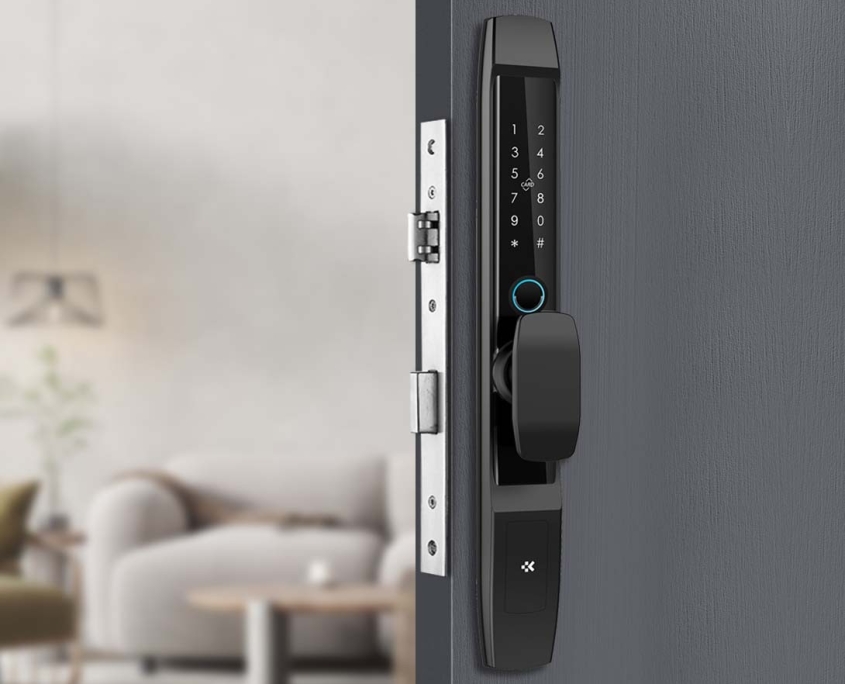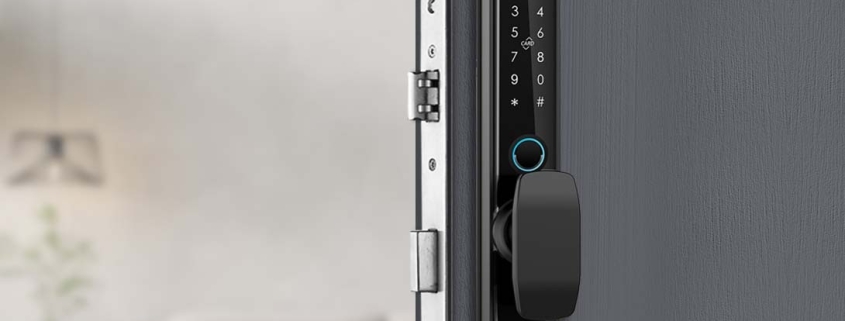How Do Bluetooth Door Locks Work?
Smart home technology is changing the way we secure our homes, and Bluetooth door locks are at the forefront of this shift. Unlike traditional locks (or even Wi-Fi smart locks), Bluetooth locks offer keyless convenience without the need for internet connectivity.
But how exactly do they work? Are they secure? And should you consider one for your home?
In this guide, we’ll break down:
How Bluetooth door locks function
Their pros and cons vs. Wi-Fi locks
Security risks and how to mitigate them
Best Bluetooth locks for U.S. homeowners
By the end, you’ll know whether a Bluetooth lock is the right choice for your front door, rental property, or vacation home.
1. What Is a Bluetooth Door Lock?
A Bluetooth door lock is a keyless smart lock that uses Bluetooth Low Energy (BLE) to communicate with your smartphone. Instead of a physical key, you can:
-
Unlock with your phone (automatically or via an app)
-
Share digital keys with family or guests
-
Lock/unlock remotely (with a hub or bridge)
How It Differs from Wi-Fi & Keypad Locks
| Feature | Bluetooth Lock | Wi-Fi Smart Lock | Keypad Lock |
|---|---|---|---|
| Connection | Phone-to-lock (BLE) | Internet-based | Standalone |
| Remote Access | Only with a hub | Yes (anywhere) | No |
| Battery Life | 6–12 months | 3–6 months | 12+ months |
| Best For | Close-range use | Full remote control | Basic keyless entry |
2. How Do Bluetooth Locks Actually Work?
Step 1: Pairing Your Phone with the Lock
-
Download the lock’s companion app.
-
Enable Bluetooth on your phone and follow the setup prompts.
-
The lock stores your phone’s unique Bluetooth ID for recognition.
Step 2: Unlocking the Door
-
Auto-Unlock (Proximity-Based): The lock detects your phone when you approach and unlocks automatically.
-
Manual Unlock (App or Button): Open the app and tap “Unlock,” or press a button on the lock itself.
Step 3: Sharing Access (Digital Keys)
-
Send temporary or permanent access to others via the app.
-
Guests get a unique Bluetooth key (no physical key copying needed).
Step 4: Power & Backup Options
-
Runs on batteries (usually 4x AA or a rechargeable pack).
-
If batteries die, most Bluetooth locks still have:
-
A physical key override
-
A 9V battery emergency terminal
-
3. Bluetooth vs. Wi-Fi Locks: Which Is Better?
Advantages of Bluetooth Locks
Longer battery life (no constant Wi-Fi drain)
No internet required (works offline)
Faster response time (no lag from cloud servers)
More affordable than Wi-Fi locks
Disadvantages of Bluetooth Locks
Limited remote access (must be near the door unless you have a hub)
No real-time alerts if you’re away (unless paired with a bridge)
Phone dependency (if your phone dies, you need a backup)
Best Use Cases for Bluetooth Locks
-
Primary homes (where you usually have your phone)
-
Rentals/Airbnbs (easy digital key sharing)
-
Offline cabins/vacation homes (no Wi-Fi needed)

4. Are Bluetooth Locks Secure?
Built-in Security Features
-
Encrypted signals (prevents hacking)
-
Auto-locking (locks after a set time)
-
Tamper alarms (if someone tries to force entry)
Potential Risks & Fixes
-
Bluetooth Hacking (Spoofing): Rare, but possible. Fix: Use a lock with rolling encryption.
-
Phone Theft: If someone steals your phone, they could unlock your door. Fix: Use biometric app locks (Face ID, fingerprint).
-
Bluetooth Range Limitations: Someone could “tailgate” if you unlock from a distance. Fix: Adjust auto-unlock proximity settings.
5. Installation: Can You DIY?
Most Bluetooth locks are easy to install if:
-
You’re replacing an existing deadbolt.
-
Your door is standard size (1-3/8” to 1-3/4” thick).
Basic Installation Steps
-
Remove old deadbolt.
-
Install new Bluetooth lock mechanism.
-
Attach interior & exterior plates.
-
Pair with your phone via the app.
Pro Tip: Some locks are retrofit designs, meaning they work with your existing deadbolt—no full replacement needed!
6. Frequently Asked Questions
Do Bluetooth locks work with multiple phones?
Yes! You can share access with family, roommates, or guests.
What if my phone dies?
Most Bluetooth locks have:
-
A physical key backup
-
A keypad option (on some models)
-
A 9V battery emergency terminal
Can I control a Bluetooth lock remotely?
Only if you add a Wi-Fi bridge or smart home hub.
Do Bluetooth locks work with voice assistants?
Some do (via a hub), but not as seamlessly as Wi-Fi locks.
7. Final Verdict: Should You Get a Bluetooth Lock?
YES if you want:
-
Keyless convenience without Wi-Fi dependency
-
Long battery life
-
Easy digital key sharing
NO if you need:
-
Remote access from anywhere (get a Wi-Fi lock instead)
-
Advanced smart home automations (Wi-Fi/Z-Wave works better)
Bottom Line
Bluetooth door locks are a secure, energy-efficient, and cost-effective alternative to Wi-Fi smart locks. They’re perfect for homeowners who want keyless entry without monthly fees or complex setups.
If you’re ready to ditch your keys, a Bluetooth lock is a great first step into smart home security.
Have you tried a Bluetooth lock? Share your experience in the comments!









